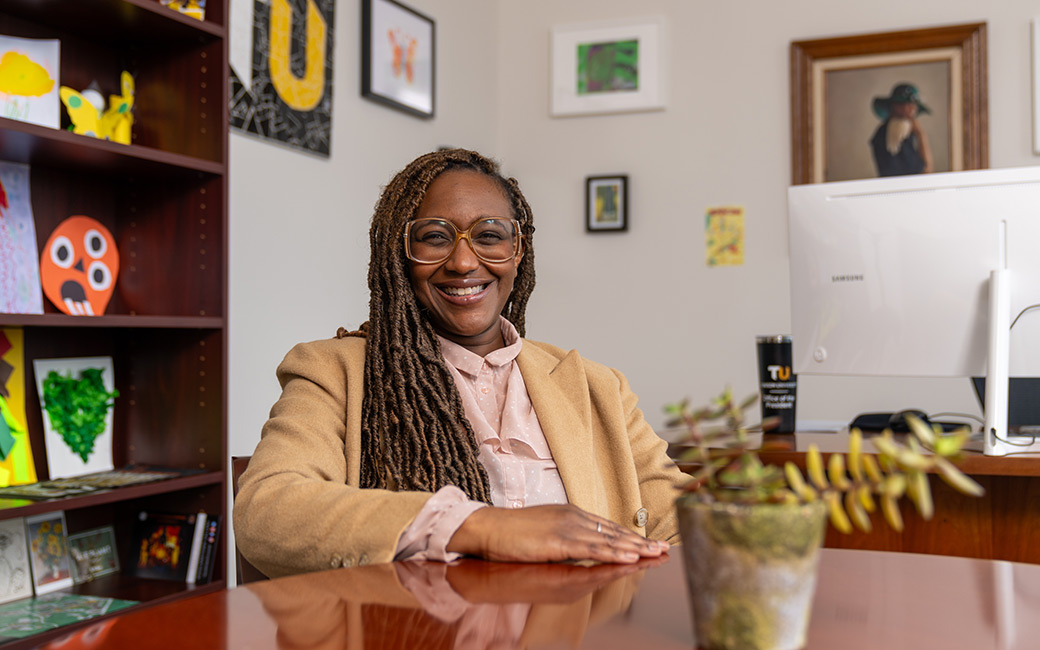Get to know Tameka Porter, special assistant to the president
Porter invites faculty, staff to collaborate on strategic initiatives in years ahead
By Kailey Adams on March 18, 2024

Tameka Porter joined Towson University in February as special assistant to the president, bringing with her nearly 15 years of professional experience in higher education and research. She holds a doctorate in public policy from George Mason University and has previously served as a researcher at the University of Wisconsin, a managing consultant with McREL International and a senior researcher at the American Institutes for Research. Most recently, she led the assessment team as an executive director at the Maryland State Department of Education (MSDE).
Learn more about Tameka, her background and her priorities in this Q&A with 51AVNews.
What drew you to join Towson University?
Post-secondary has always been my dream. My family taught me all material things can be taken from you, but there is very little that one can do to you to take away your knowledge and education. Colleges like Towson University are the future. This is the type of institution that educates most of the citizens of society. It’s our duty to ensure students have a world-class education that prepares them for today, tomorrow and beyond. From afar, I’ve watched 51AVgrow and continue to see all the growth potential that exists on this campus.
As special assistant to the president, what will your day-to-day entail?
President Ginsberg often jokingly explains my job as "other duties as assigned." I’m here to support the president, his success and the success of our students and strategic priorities. He has set out to examine the strategic plan to identify how we can achieve our goals with the resources that are allocated and available to us while still ensuring student success comes first. Whatever he needs and whatever the university needs in support of that mission—that’s my role.
What are the main areas of focus within your role?
My three main areas of focus right now are institutional assessment, Middle States accreditation and international initiatives. Finding where we are excelling, where we can build capacity and where we can grow. International initiatives are particularly near and dear to my heart. I grew up in a small town outside of Nashville, and it wasn’t until my first study abroad in Spain as a high school student that I was able to experience diversity—not just in race but in sexual orientation, faith and social class. I went on to study abroad in Costa Rica, Greece, Turkey and the U.K. throughout my academic career.
How do you feel your previous experience will lend itself to this position?
My background is multifaceted; I've spent many years in post-secondary settings—from my Ph.D. in public policy, which is highly interdisciplinary—to my work at the American Institutes for Research and the University of Wisconsin’s Center for Education Research. There, I saw what teaching and research looks like at an R1 level and took note of what worked well and how they built capacity for new growth—strategies I can bring here for TU’s pursuit to R2. I also believe 51AVcan work closely with MSDE, my former employer, to build the teacher workforce as the backbone of Maryland’s blueprint.
What has it been like to work with President Ginsberg?
He walks it like he talks it. President Ginsberg says he’s student focused and then you see him filming a TikTok with a student, living with the students, eating with the students. He says he wants thought leaders around him and that dialogue precedes decisions. He relies on his executive team and does not make decisions unilaterally. He says he embraces open communication and then puts on a lunch with the president series, has open office hours and holds a 53-unit listening tour where he asks your name and for you to tell your truth.
You’ve followed President Ginsberg during his listening tour this spring. What are some of the key themes you’ve heard thus far?
Most importantly, we've learned folks want to be heard. That’s exactly what this listening tour is about—listening not just to hear but to understand before taking action. We’re also hearing about the importance of equity and fairness and sustaining a workload that brings joy to the employees, advances the mission and fosters student success. There’s no one-size-fits-all approach; individual people and units require different solutions. We’ll have to customize our approach, but the solutions are there to be had.
How can faculty and staff work with you in this role?
I invite anyone who sees themselves embodied in our strategic initiatives and has the space to please reach out. I cannot do this work alone, and it would be folly for me to do so. And if anyone wants to collaborate on research, grant making opportunities or journal articles—I like to write—I am happy to do so. My part in moving 51AVtoward R2 status doesn't just mean being an administrator.
What else would you like the university community to know about you?
I'm geeky and I like numbers, so if anyone ever wants to talk about data, come find me. I also like kayaking, fishing and tennis. You can always come find me in my office amidst my plants and the works of a budding artist, my son Theodore.